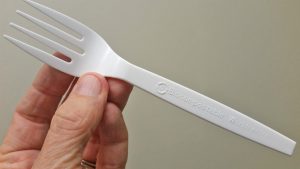Abstract
Most modern-day plastics are made from petroleum, but several different types of plastics are made from plant or even bacterial sources. This 4-page fact sheet written by Maia Patterson McGuire and published by the UF/IFAS School of Forest Resources and Conservation describes four types of these bioplastics and explains why, even if a bioplastic item is listed as “compostable,” a reusable, washable alternative is often the better choice.
http://edis.ifas.ufl.edu/fr418
References
Latini, G., A. Verrotti, and C. De Felice. "DI-2-Ethylhexyl Phthalate and Endocrine Disruption: A Review." Current Drug Targets - Immune, Endocrine & Metabolic Disorders 2004 4 (1): 37-40. https://doi.org/10.2174/1568008043340017
Puls, J., S. A. Wilson, and D. Hölter. "Degradation of Cellulose Acetate-Based Materials: A Review." J Polym Environ 2011 19: 152. https://doi.org/10.1007/s10924-010-0258-0
Kenny, S. T., J. N. Runic, W. Kaminsky, T. Woods, R. P. Babu, C. M. Keely, W. Blau, and K. E. Connor. 2008. "Up-Cycling of PET (Polyethylene Terephthalate) to the Biodegradable Plastic PHA (Polyhydroxyalkanoate)." Environmental Science & Technology 42 (20): 7696-7701 https://doi.org/10.1021/es801010e
Unless otherwise specified, articles published in the EDIS journal after January 1, 2024 are licensed under a Creative Commons Attribution-NonCommercial-NoDerivs 4.0 International (CC BY-NC-ND 4.0) license.

